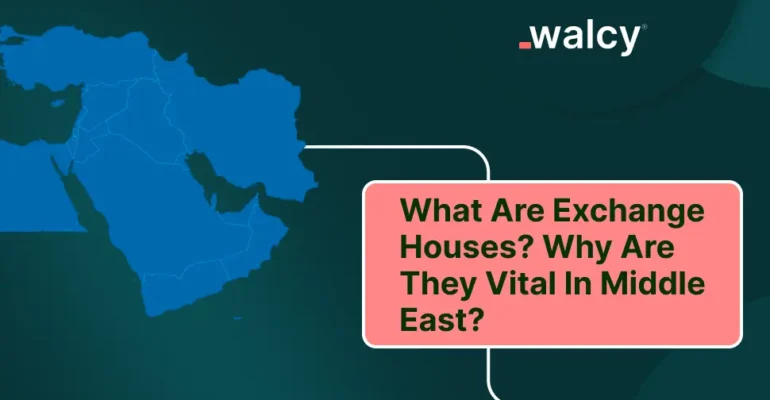Exchange houses play an essential role in the financial landscape of the Middle East. Mostly known as currency exchange houses or even money exchange houses, they are special types of financial service providers that offer different professional services relating to foreign exchange, thus facilitating personal and commercial cross-border transactions. Considering its heterogeneous population, huge remittances, and heavy trade volumes, they must be regarded as in the Middle East. This blog would like to delve into what an exchange house is, its importance in the Middle East, the present trends, the challenges, and a comparison with banks.
What Are Exchange Houses?
These exchange houses are a form of financial institution that works at a professional level when it comes to their foreign exchange services. They allow currency exchange and remittance services; some provide other financial products, such as prepaid cards and travel insurance. Unlike banks, exchange houses concentrate more on cross-border transactions, thus representing an option for people and businesses requiring quick and effective currency conversion and money transfers.
These houses are usually located in areas that have large numbers of expatriates, whereby the volume of foreign exchange business is potentially large. In the Middle East, these exchange houses have become an integral part of the financial scene and provide services for a very diverse and highly mobile population.
Role of Exchange Houses in the Middle East
Some of the crucial roles of exchange houses especially in the Middle East include:
- Handle High Volume of Remittances
Estimates suggest that millions of expatriates live in the Middle East, all of whom regularly remit money to their countries of origin. The exchange houses provide an essential service in offering cheap and fast remittances among people. More often than not, they are tied up with international money transfer operators that help them efficiently undertake cross-border transactions.
- Access to Foreign Currencies
Strong trade relations and heavy touring necessitate, at all times, the need for currency exchange services. The availability of a large variety of foreign currencies is fed to the customer, usually at a better price than most of the local banks, by the exchange houses. moreover, it provides access to various foreign currencies.
- Convenience and Accessible for all
Exchange houses have quite an accessibility, mainly based in commercial centers, cities, shopping centers, and nearby airports. Their long operating hours and express services have also made the houses convenient for customers when one want to exchange his or her money or even send money to foreign countries without experiencing the bureaucracy of the banks.
- Specialized Services
Most of the exchange houses provide customized services in line with customers’ demands. For example, it can give better rates of exchange for big transactions or provide special services for business houses engaged in international trade.
You might like to read about: International Remittance Business
Current Scenario of Exchange Houses
- Digital Transformation
The most current and upcoming trend is the rapid migration of exchange houses to digital platforms to keep up in the race. With mobile apps and online services, customers can now easily do everything from home and reduce the hassle of visiting personally at the branches of the exchange house. This digital transformation of exchange house is making the foreign exchange market more competitive.
- Expanding Services
Service diversification is also seen to be trendy these days. Most of the exchange houses are targeting the need specific customers and different unique products and services are offered to cater their needs. New products that are offered to clients include prepaid travel cards, online bill payments, and even investment avenues in foreign currencies.
- Regulatory Compliance
With the ever-growing demand for financial transparency and adherence to AML laws, exchange houses are using compliance technologies to drive answers to these regulatory calls. This trend assumes a special place in the Middle East, where some very stringent financial regulations have been instituted. (Read about: What Is Money Laundering?)
- Partnerships and Alliances
Lastly, exchange houses these days are making tie-ups with international money transfer operators, fintech companies, and even banks to enhance their service offerings to increase their customer base.
Exchange Houses vs. Banks: Key Differences
- Specialization
Mostly exchange houses deal only with currency exchange and remittance; however, a bank covers all ranges of financial products and services from loans to savings accounts and even investment opportunities.
- Speed and Efficiency
It is mainly identified as a house of quick and excellent service, be it in the sphere of currency exchange or money transfer. Banks, in contrast, may be highly bureaucratized and therefore time-consuming for the same services.
- Cost-Effectiveness
Most exchange houses charge lower rates for money transfers at better exchange rates than banks; hence, they become the first choice by individuals and companies to save on transaction costs.
- Accessibility
Better accessibility in terms of location and operating hours characterizes exchange houses, especially in the Middle East, where most of them can be found in expatriate and tourist locales.
Future of Exchange Houses in the Middle East
A promising outlook posits the future of the exchange house in the Middle East, fanned by continuous economic growth in the region and a heavy influx of expatriates that has rapidly increased the demand for cross-border transactions. However, for the exchange houses to remain relevant, it would mean accommodating digital transformation, enriching services, and increasing compliance with regulatory requirements. Activities can also become more efficient and secure by integrating advanced technologies such as blockchain to cut down on the costs of services.
Moreover, against the backdrop of changing financial landscapes, exchange houses could decide on various types of innovative business models, such as offering digital wallets or tying up with several fintech companies likely to offer innovative solutions. Specialties can be open to more customized services through cooperation with such fintech’s, access to unserved markets, and catering to the more youthful and tech-savvy segment of the population. It will be their ability to adapt, thereby remaining responsive to changing customer needs and market conditions, that will make all the difference in terms of long-term success and maintaining competitiveness within a progressively globalized and digital economy.
Challenges of Exchange House
- Regulatory Pressure
This regulatory pressure on the exchange house sector, concerning AML and CTF, has recently only been rising. Such regulation brings with it huge investments in technology and people training, which can be a challenge for the smaller exchange houses.
- Competition from Banks and FinTech’s
Traditional banks and FinTech firms are very aggressive in developing their foreign exchange and remittance operations, and hence, this stiff competition to the exchange house becomes part of the business. For any exchange house to remain competitive, therefore, there needs to be innovation and continuous value addition.
- Currency Volatility
Changes in the exchange rate may reduce the profit margins of an exchange house, hence impacting its overall financial stability. Since some nations have volatile currency dynamics, this requires exchange houses to develop high-end strategies for hedging against the fluctuations in currencies.
- Cybersecurity Risks
Added to these concerns is the fact that, with the spreading digital wave of services, it will not be too long before the exchange houses themselves are attacked. With the ever-increasing complexities of cyber threats, these exchange houses will have to invest in advanced cybersecurity measures and continuous monitoring of systems to keep them safe. Protection of customer data and security related to online transactions would be one of the prime agendas for any firm, since a single breach may cause substantial damage to their reputation and customer trust.
Read about: The Spot Exchange Rate | The Interbank Exchange Rate
Conclusion
To conclude, exchange houses contribute to the financial ecosystem in the Middle East by providing services that cater to diverse populations. It offers currency exchange and remittance services in a fast, smooth, and convenient manner and has established its prominence in this region. With the growing demand for cross-border transactions, the role of exchange houses in facilitating global financial connectivity becomes more essential. In the future, the major challenges an exchange house has to overcome for being successful will be the issues of compliance, competition, technology, and innovative ways to ensure products offered meet the changing expectations of customers.
FAQs
- What are the services that the exchange house offers?
Though essentially a currency exchange and remittance business, many exchange houses give additional services like prepaid cards, online bill payments, and travel insurance.
- Why do people in the Middle East prefer an exchange house over banks to exchange currencies?
Compared to banks, exchange houses are more accessible, and have faster services; hence, they are preferred more for currency exchange in the Middle East.
- How do exchange houses ensure regulatory compliance?
Exchange houses shall make investments in compliance technologies, staff training, and robust internal controls to meet regulatory requirements, particularly concerning AML and CTF.
- What is the future of Middle East exchange houses?
The outlook is promising, with multiple avenues of growth opening out through digital transformation, expansion of services, and partnerships, but exchange houses really need to keep up in changing market conditions and regulatory environments in the fight for competitiveness.
Do follow us on Facebook and Linkedin, to stay connected with us.



